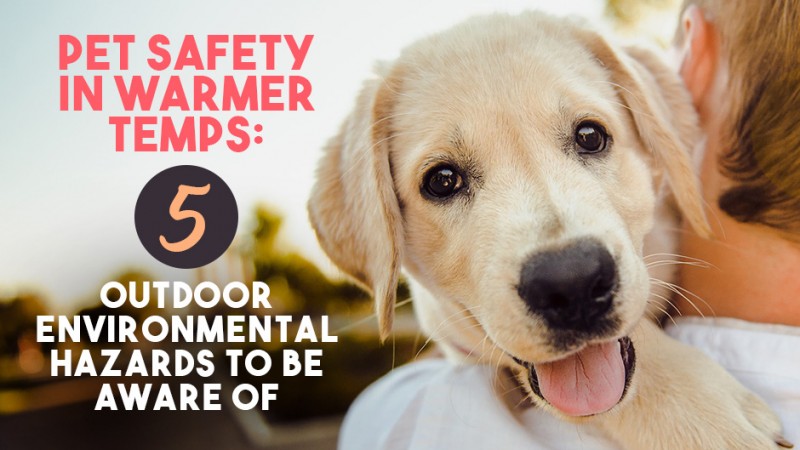Turner Veterinary Clinic News
Pet Safety In Warmer Temps

As a pet owner, you look forward to the warmer spring weather because it means you can finally spend more time outdoors with your furry friend. Unfortunately, it also means more exposure to environmental hazards for your dog or cat. This requires awareness of these dangers and active steps on your part to help your pet avoid them.
Blue-Green Algae
Cyanobacteria, more commonly known as blue-green algae, are microscopic in size and located in ponds, streams, and freshwater lakes. They can be extremely toxic to dogs, cats, horses, birds, and cows. Diarrhea, vomiting, seizures, breathing difficulty, skin and mucous membrane discoloration, and disorientation are some of the most serious symptoms associated with blue-green algae. Severe poisoning can cause death, so it’s essential to contact your veterinary team at Turner Veterinary Clinic immediately if you suspect that your pet has ingested this, or if your pet is exhibiting any symptoms.
Fishing Lure Hazards
As you bring out your fishing gear, make sure to keep tackle and boxes out of reach of your curious canine, who likely is drawn to them by their scent. A lure can easily become embedded in your pet’s mouth or swallowed. Should this happen to your pet, please do not try to remove it on your own. Call us immediately. We may sedate your pet prior to an x-ray to help him or her from preventing further damage to their existing injury.
Unfortunately, not all anglers clean up after their fishing expeditions. Be wary of beaches and docks which may contain left-behind lures. Our pets are unable to recognize the dangers, and this is a situation where you need to see the environment through your pet’s eyes.
Leptospirosis
Leptospirosis is a disease commonly carried by raccoons. Dogs typically acquire the bacteria that causes leptospirosis through contact with infected urine, water, or soil, often left behind by raccoons. Pregnant dogs can pass the bacteria to their puppies and the disease can also affect humans.
Common symptoms including shivering, fever, appetite loss, vomiting, diarrhea, jaundice, and eye inflammation.
Treatment typically consists of a combination of supportive care and antibiotics. We will recommend the Leptospirosis vaccination for your pet if he has an exposure risk to the bacteria.
Rabies
An unvaccinated pet can acquire rabies when he or she receives a bite from an infected wild animal or has contact with its saliva. As with Leptospirosis, one common carrier of rabies include raccoons. An infected animal with saliva on its paw can transmit rabies to your pet with just a scratch. It then takes up to 60 days for the virus to travel to your pet’s central nervous system.
Typical symptoms include behavioral changes, seizures, disorientation, paralysis of the back legs, and appetite loss. No cure for rabies currently exists, which means animals in advanced stages must be euthanized. Rabies vaccinations are effective in prevention. If your pet needs his or her vaccination, contact us at 269-962-9955 to schedule an appointment.
Water Safety
Many dogs love swimming and going for a boat ride, especially when it means more time to spend with you! If you allow your dog to go swimming in open water, make sure that you’re no more than an arm’s length away, in case he or she starts to struggle. It’s also a good idea to invest in a dog-sized lifejacket for boating and being around water. Never assume that your dog instinctively knows how to swim because this simply isn’t true of all breeds.
Additionally, be aware that your dog can get an ear infection from swimming. Dog breeds with floppy ears, such as golden retrievers and cocker spaniels, are even more susceptible to this problem. Indications of an ear infection can include head shaking, odor, inflammation, and scaly skin near the ear. Be sure to let your dog’s ears dry out after swimming and clean them often to prevent infection. If you notice any signs of ear infection, please give us a call, as this is highly uncomfortable and painful for your pet.
We hope the above tips will help you enjoy a happy and healthy outdoor season with your pet!
Image credit: Pixabay
Categories
Recent Posts

February is often associated with love, thanks to Valentine’s Day, and that makes it a perfect time to show extra care to the pets who mean so much to us. While treats and cuddles are always appreciated, one of the most meaningful ways to support your pet is by focusing on their health from the inside out. Dental health and heart health may seem like separate topics, but they are closely connected and both play a major role in your pet’s overall wellness.

When was the last time your pet saw the veterinarian for a checkup, not because they were sick, but just to stay healthy? Preventive care is one of the most important ways to give your pet a longer, happier life. It’s not about doing one big thing. It’s about the small, consistent steps that help avoid bigger health problems later on.

The holidays are full of sparkle, laughter, travel, and to-do lists a mile long. As joyful as this season can be, it often means busier schedules and less time for everyday routines. In the middle of the holiday rush, it's easy to overlook one very important family member: your pet.

If you're lucky enough to have a senior pet, you know just how special that bond becomes over time. From cozy afternoons on the couch to the look in their eyes that says, "I've known you forever," there’s a deep and quiet understanding between you. As pets get older, though, their needs change. Aging isn’t a disease, but it does require us to adapt how we care for our beloved companions.
The good news? With the right care and attention, senior pets can enjoy happy, healthy golden years. Here are seven simple but meaningful health tips to help your older dog or cat feel their best.

Has your dog seemed a little more reserved lately, or is your cat less interested in playing with their favorite toys? It can be easy to attribute these changes to aging or mood, but pets are experts at hiding discomfort. The good news is that there are plenty of subtle signals that can provide clues that your pet may be experiencing pain, and many treatment options to help alleviate this discomfort.